-

新人教版高中英语必修3Unit 1 Festivals and Celebrations-Reading for writing教学设计二
Step 3 Analyzing article structureActivity 31. Teachers raise questions to guide students to analyze the chapter structure of this diary and think about how to describe the festival experience. (1)What should be included in the opening/body/closing paragraph(s)?(2)How did the writer arrange his/her ideas?(3)What kind of interesting details did the writer describe?(4)How did the writer describe his/her feelings/emotions during the event?2. Students read and compare the three sentence patterns in activity 2. Try to rewrite the first paragraph of the diary with these three sentence patterns. After that, students exchange corrections with their partners. Such as:●This was my first time spending three days experiencing the Naadam Festival in China’s Inner Mongolia Autonomous Region and it was an enjoyable and exciting experience. ●I'll never forget my experience at the Naadam Festival because it was my first time to watch the exciting Mongolian games of horse racing, wrestling, and archery so closely. ●I'll always remember my first experience at the Naadam Festival in China’s Inner Mongolia Autonomous Region because it was so amazing to spend three days witnessing a grand Mongolian ceremony. Step 4 Accumulation of statementsActivity 41. Ask the students to read the diary again. Look for sentences that express feelings and emotions, especially those with the -ing form and the past participle. Such as:● …horse racing, wrestling, and archery, which are all so exciting to watch. ● some amazing performances● I was surprised to see…● I was a little worried about. . . ● feeling really tiredOther emotional statements:●I absolutely enjoyed the archery, too, but the horse races were my favourite part. ●I'm finally back home now, feeling really tired, but celebrating Naadam with my friend was totally worth it. ●He invited me back for the winter to stay in a traditional Mongolian tent and cat hot pot. I can’t wait!2. In addition to the use of the -ing form and the past participle, the teacher should guide the students in the appreciation of these statements, ask them to memorize them, and encourage them to use them reasonably in writing practice.

新人教版高中英语必修3Unit 1 Festivals and Celebrations-Reading for Writing教学设计一
The topic of this part is “Write about your festival experience”.During the Listening and Speaking and Talking, students are just asked to say out their festival experiences such as the Spring Festival, Mid-autumn Day, but this part students will be asked to write down their own festival experiences. During the reading part, it introduces the Naadam Festival in Inner Mongolia Autonomous Region, which can give students a good example to imitate. Students not only learn the festival, but touch and feel the Inner Mongolian’s character, the spirit and cultural atmosphere, which can help students form the cultural awareness and learn to enjoy and value the diversity of Chinese culture.Concretely, the dairy tells the experience that the author spent the Naadam Festival in Inner Mongolia Autonomous Region with his/her friend. The structure is clear. In the opening paragraph, it introduces the topic of the Naadam Festival and the whole feeling. Then it introduces the items of the festival like the ceremony, wrestling and horse racing. Finally, it summarizes this experience. Because this part is a travel journal, we must guide students pay more attention to these details: 1. use the first person. 2. use the past tense to tell the past thing and use the present or future tense to describe the scenery. 3. use the timeline to tell the development. 4. be careful for the author’s psychology, emotion and feeling, etc.1. Read quickly to get main idea; read carefully to get the detailed information about Naadam Festival.2. Learn the structure of the reading article and language.3. Write an article about a festival experience4. Learn to use the psychology, emotions and feeling in the writing.1. Write an article about a festival experience.2. Use the structure of the reading article and language.

新人教版高中英语必修3Unit 2 Morals and Virtues-Discovering Useful Structure教学设计
1. 表示时间。Hearing these stories, I’m skeptical about the place. = When I heard these stories. . . 2. 表示原因。Not knowing his address, I can’t send this book to him. = Because/Since/As I don’t know his address. . . 3. 表示结果。His father died, leaving him a lot of money. =. . . and left him a lot of money4. 表示条件。Going straight down the road, you will find the department store. = If you go straight down the road. . . 5. 表示让步。Being tired, they went on working. =Although they were tired. . . 6. 表示行为方式、伴随情况或补充说明。He lay on the grass, staring at the sky for a long time. =. . . and stared at the sky for a long time注意:非谓语动词作状语时, 如所提供的动词不能和句子中的主语保持一致, 动词-ing形式必须有自己的逻辑主语, 通常由名词或代词来担任, 这就是独立主格结构。The last bus having gone, we had to walk home. (having gone的逻辑主语是the last bus, 而不是we)Weather permitting, the football match will be played on Friday. (permitting的逻辑主语是time, 而不是the football match)Step 7 Practice1. ________(study) hard, you are sure to get first prize. 2. People use plastic in their daily life, _______(leave) large amounts of waste. 3. ________(work) hard at your lessons, you are to succeed. 4. The old man, ____________(work) abroad for twenty years, is on the way back to his motherland. 5. ______________(finish) his homework, he was playing on the playground. Answers: 1. Studying 2. leaving 3. Working 4.having worked 5. Having finishedStep 8 HomeworkFinish the homework on Page 22.

新人教版高中英语必修3Unit 2 Morals and Virtues-Reading and Thinking教学设计
The topic of this part is “Learn to make choices in life”.The Listening & Speaking & Talking part aims at the moral dilemmas, and this part is about making choices in life. The heroin is Lin Qiaozhi, a famous medical scientist, made a great contribution to our country’s medical care. Most importantly, her life experience can inspire our students whether in studying or the development of career. she had moral dilemmas and life choices, which are similar to the students who will step into society. Besides, Lin has quite good virtues like kindness, self-improvement, insistence, job-loving , generosity and responsibility, which is worth being learned.Concretely, this article is a biography about Lin Qiaozhi. The article tells her whole life according the timeline, among which the life choices is emphasized. For example, whether married or chased her dream, returned home or stayed abroad, family or public, her choices all reflected her faith, spirit, responsibility and devotion.1. Fast reading to get the detailed information about Lin Qiaozhi; careful reading to do the deductive information.2. Learn the reading skills--deductive judgement according the context.3. Study the structure features and language features. 4. Communicate about Lin’s life choices and reflect their own life choices.1. Learn the reading skills--deductive judgement according the context.2. Study the structure features and language features.3. Communicate about Lin’s life choices and reflect their own life choices.Step 1 Lead in---Small talkWhat are some important life choices?Importance choices: university study, jobs and marriage partners. Because they can determine our future.

新人教版高中英语必修3Unit 2 Morals and Virtues-Reading for Writing教学设计
1. 这个寓言是一个关于一位国王古寓言。 The fable is an old fable about a king.2.作者用这个故事让读者对于社区的问题负有个人责任的必要印象深刻。The author used the story to impress upon readers with the need to take personal responsibility for problems in the community.3. 这个故事十分成功的实现了它的目的。The story was quite successful in achieving its purpose.Step 7 WritingPlease write a review of the story according the outline above.The fable is an old fable about a king who thought his people are lazy, so he put a large stone in the middle of the road and hides and waited to see if anyone will try to move it.The author used this story to impress upon readers with the need to take personal responsibility for problems in the community. The story was quite successful in achieving its purpose, and I liked it because it had a clear moral.However, while the moral of the story is clear, the actions of the king seemed pointless to me, because none of the characters in the story learnt anything. For this reason, I think there are better stories that can be used to impress upon people with the need for personal responsibility.Step 8 Pair workExchange drafts with a partner. Use this checklist to help your partner revise his/her draft.1. Does the writer give a short description of the story ?2. Does the description include the most important details of the story ?3. Does the writer give his or her opinion about the character or their actions ?4. Is the review well-organised ? 5. Does the writer use the -ing form as the adverbial correctly in the writing ?6. Are there any grammar, spelling, or punctuation errors ?Step 9 HomeworkPut up your revised draft in the classroom or read it to your class.

新人教版高中英语必修3Unit 3 Diverse Cultures-Discovering Useful Structure教学设计
Step 4 PracticeRead the conversation. Find out which words have been left out.Justin: Linlin, I’m going to Guizhou Province next month. I’m super excited! Any recommendations for places to visit?Linlin: Wow, cool! Guizhou is a province with a lot of cultural diversity. Places to visit...well, definitely the Huangguoshu Waterfall first.Justin: What’s special about the waterfall?Linlin: Well, have you ever heard of the Chinese novel Journey to the West ?Justin: Yes, I have. Why ?Linlin: In the back of the waterfall, you will find a cave, which is the home of the Monkey King.Justin: Really? Cool! I’ll definitely check it out.Linlin:And I strongly recommend the ethnic minority villages. You’ll find Chinese culture is much more diverse than you thought.Justin:Sounds great, thanks.Answers:Justin: Linlin, I’m going to Guizhou Province next month. I’m super excited! Do you have any recommendations for places to visit?Linlin: Wow, that’s cool! Guizhou is a province with a lot of cultural diversity. What are some places to visit in Guizhou ? Well, definitely the Huangguoshu Waterfall is the first place to visit in Guizhou Province.Justin: What’s special about the waterfall?Linlin: Well, have you ever heard of the Chinese novel Journey to the West ?Justin: Yes, I have heard of the Chinese novel Journey to the West . Why do you ask if I have heard of the Chinese novel Journey to the West?Linlin: In the back of the waterfall, you will find a cave, which is the home of the Monkey King from Journey to the West.Justin: That’s really true? It’s Cool! I’ll definitely check it out.Linlin:And I strongly recommend the ethnic minority villages on your trip to Guizhou Province. You’ll find Chinese culture is much more diverse than you thought it was.Justin:This all sounds great, thanks.

新人教版高中英语必修3Unit 3 Diverse Cultures-Listening &Speaking&Talking教学设计
1. In Picture 1 and Picture 2, where do you think they are from? How do you know?From their wearings, we can know they are from ethnic minority of China--- Miao and Dong.Picture 1, they are playing their traditional instrument lusheng in their traditional costumes.Picture 2. the girls are Miao because they wear their traditional costumes and silver accessory.2. In Picture 3, can you find which village it is? What time is it in the picture?It is Dong village. It is at night. Step 2 While-listeningJustin met a new friend while traveling in Guizhou. Listen to their conversation and complete the summaries below.Part 1Justin and Wu Yue watched some Miao people play the lusheng. The instrument has a history of over 3,000 years and it is even mentioned in the oldest collection of Chinese poetry. Then they watched the lusheng dance. Justin wanted to buy some hand-made silver/traditional accessories as souvenirs. He was told that the price will depend on the percentage of silver. Part 2They will go to a pretty Dong minority village called Zhaoxing. they will see the drum towers and the wind and rain bridges. They may also see a performance of the Grand Song of the Dong people.Step 3 Post-listening---TalkingWork in groups. Imagine Justin is telling some friends about his trip to Guizhou. One of you is Justin and the rest of you are his friends. Ask Justin questions about his trip and experience. The following expressions may help you.

新人教版高中英语必修3Unit 4 Space Exploration-Listening&Speaking&Talking教学设计二
The themes of this part are “Talk about how to become an astronaut” and “Talk about life in space”. As Neil Armstrong said “Mystery creates wonder and wonder is the basis of man’s desire to understand. Space is difficult for human to reach, therefore, humans are full of wonders about it. However, if wanting to achieve the dream of reaching the Moon, some of our human should work hard to be an astronaut at first. Part A(Talk about how to become an astronaut) is a radio interview in a radio studio, where the host asked the Chinese astronauts about his story how to become an astronaut. Yang Liwei told his dreamed to be an astronaut since childhood. Then he worked hard to get into college at 22. The next 10 years, he gradually became an experienced pilot. At the same time, to be an astronaut, he had to study hard English, science and astronomy and trained hard to keep in good physical and mental health and to practise using space equipment. Part B (Talk about life in space) is also an interview with the astronaut Brown, who is back on the earth. The host Max asked about his space life, such as his emotion about going back the earth, the eating, shower, brushing, hobbies and his work. Part A and Part B are interviews. So expressing curiosity about the guests’ past life is a communicative skill, which students should be guided to learn.1. Students can get detailed information about how Yang Liwei became an astronaut and Max’s space life.2. Students learn to proper listening strategy to get detailed information---listening for numbers and taking notes.3. Students can learn related sentences or phrases to express their curiosity like “ I wish to know...” “I’d love to know...”4. Students can learn more about the space and astronauts, even be interested in working hard to be an astronaut

新人教版高中英语必修3Unit 4 Space Exploration-Reading and Thinking教学设计一
Q4: What is the function of the International exploration ?Having astronauts from different countries on boardQ5: What can you learn from Para 4 ?China has made great achievements in exploring spaceQ6: What is the attitude to the space exploration ?SupportiveStep 6 Post reading---RetellPeople have always wanted to learn more about space. Before the mid-20th century, most people felt (1)_________ (travel) into space was an impossible dream. However, (2)____ the help of scientists, peoplesucceeded in realizing their dream (3) _________ (explore) space. On 4 October 1957, the Sputnik 1 satellite (4) ____________(launch) by the USSR. (5) ________________ scientists try to make sure nothing goes wrong, accidents can still happen. These disasters made everyone(6)___________(disappoint), but people still believe in the importance of (7) ________(carry) on space exploration. In 2003, China became the third country to (8)_____________ (independent) send humans into space. Then Shenzhou 6 and 7 completed (9)____ second manned orbit and the first Chinese spacewalk. In spite of the difficulties, scientists hope future (10)__________ (discovery) will not only enable us to understand the universe but also help us survive well into the future.Answers: 1. travelling 2. with 3. to explore 4. was launched 5. Although6. disappointed 7. carrying 8. independently 9. a 10. discoveriesStep 6 Post reading---Critical thinkingQ1: What do you think of the space exploration ? I think it is beneficial to us. Through further study of space, people will make full use of it in the future, such as the space experiments by Wang Yaping in Tian Gong 1.Q2: If you are determined to be an astronaut, what should you prepare at present ?First of all, I should study hard to get a related college degree. Besides, I must keep mental and physical healthy.Step 7. HomeworkTry to summarize the structure of the article by a mind map.

新人教版高中英语必修3Unit 5 The Value of Money- Discovering Useful Structure教学设计
Step 3 Meaning1. 过去将来时表示从过去某一时间来看将要发生的动作或存在的状态, 常用在宾语从句中。一般由“would/should +动词原形”构成。She hoped that they would meet again someday. 她希望将来有一天他们能再见面。2. was/were going to+动词原形: 表示过去将要发生或很有可能发生的动作, 常用于口语中, 表示预言、意图或者打算等。He was going to start work the following week. 他打算下星期开始工作。3. was/were about to do: 常用来表示即将发生的动作, “刚要/正要做……”。注意该结构不与任何时间状语连用。I felt that something terrible was about to happen. 我感到某种可怕的事情即将发生。4.was/were to do: 表示“曾计划做某事”, 如果表示“本来计划做某事, 动作没实现”, 则需用 “was/were to have done”。She said she was to have told me about the accident. 她说她本来想告诉我关于事故的事。5.Start, go, come, leave, see, meet等动词的过去进行时: 表示就过去某一时刻而言即将发生的动作。She was coming later. 她随后就来。I had just put on my overcoat and was leaving to visit a friend of mine. 我刚穿上外套要去看我的一个朋友。

新人教版高中英语必修3Unit 5 The value of money-Reading and Thinking教学设计二
? Could you offer me some kind of work here?? I don’t want your charity, I just want an honest job.? Careless: I landed in Britain by accident.Step 7:Consolidation.? Find Henry? Roderick and Oliver were I .making a bet when they saw Henry, a poor young man. ? Know Henry? About a month ago, Henry was sailing and later he found himself carried out to sea by a strong wind. Fortunately, he 2.was spotted by a ship. And it was the ship that brought him to 3.England? Offer money to Henry ? Oliver and Roderick gave Henry a letter and told him that there was money in it. They 4.persuaded him to accept it, and made him 5.promise that it wouldn't be opened until 2 o'clock.Step 8:Language pointsa large amount of: a large quantity of; a great deal ofe.g. They bought a large amount of furniture before they moved their new house.make a bet: make an arrangement to risk money, etc. on an event of which the result is doubtful.e.g. We made a bet on the result of the match.permit sb to do something: allow somebody to do somethinge.g. My mother doesn’t permit me to ride in the street after it rained.by accident: as a result of chancee.g. I only found it by accident.stare at: look at somebody or something with the eyes wide open in a fixed gaze( in astonishment, wonder, fear, etc)to be honest: to tell you the truth; to be franke.g. To be honest, I don’t think we have a chance of winning.Step7 Homework:What do you think will happen to Henry? Will the bank-note help him or get him into trouble?

新人教版高中英语必修3Unit 5 the value of money-Reading For Writing教学设计一
【参考范文】Narrator:(Henry is smiling as he leaves the restaurant. As he is walking down the street, he sees a sign for a place that cuts hair. He decides to get it cut. )H=Henry;B=Barber;R=rude manH:Good afternoon, I'd like to get a cut, if I may. (The barber looks at Henry's hair and continues cutting another man's hair. )Er, I'd really like a haircut. As you can see it's much too long. B:(in a rude manner) Yes, I can see that. Indeed, I can. H:Fine, well I'll have a seat then. (He sits in one of the barber's chairs. The barber turns to look at Henry. )B:It's quite expensive here, you know!Are you sure you can afford it?H:Yes. I think so. (In comes the rude man. )R:Hey you there. I need a haircut quickly. Can you do me straightaway?B:All right, then, get in the chair and I'll see what I can do. R:Thank you. (sits down in one of the barber's chairs)H:Excuse me, but I was here first. Aren't you going to do my hair first?B:This man's in a hurry. H:Well so am I!I insist that you cut my hair first. B:OK, but I'll have to be quick. This gentleman is waiting. H:Thank you. (They both become quiet. After his hair is cut, the barber tells Henry how much he must pay. Henry shows the barber the bank note. )B:Why, Mr . . . (looks shocked)H:Adams. Henry Adams. I'm sorry, I don't have any change. R:You're that Mr Adams! Well,I'm glad I waited or I might never have known it was you. B:Why, Mr Adams, please don't worry!(wearing a big smile) Nothing to worry about!Nothing at all!Please come back any time, even if you only need too little hairs cut!It will be my honour to serve you!

新人教版高中英语选修2Unit 1 Science and Scientists-Discovering useful structures教学设计
The grammatical structure of this unit is predicative clause. Like object clause and subject clause, predicative clause is one of Nominal Clauses. The leading words of predicative clauses are that, what, how, what, where, as if, because, etc.The design of teaching activities aims to guide students to perceive the structural features of predicative clauses and think about their ideographic functions. Beyond that, students should be guided to use this grammar in the context apporpriately and flexibly.1. Enable the Ss to master the usage of the predicative clauses in this unit.2. Enable the Ss to use the predicative patterns flexibly.3. Train the Ss to apply some skills by doing the relevant exercises.1.Guide students to perceive the structural features of predicative clauses and think about their ideographic functions.2.Strengthen students' ability of using predicative clauses in context, but also cultivate their ability of text analysis and logical reasoning competence.Step1: Underline all the examples in the reading passage, where noun clauses are used as the predicative. Then state their meaning and functions.1) One theory was that bad air caused the disease.2) Another theory was that cholera was caused by an infection from germs in food or water.3) The truth was that the water from the Broad Street had been infected by waste.Sum up the rules of grammar:1. 以上黑体部分在句中作表语。2. 句1、2、3中的that在从句中不作成分,只起连接作用。 Step2: Review the basic components of predicative clauses1.Definition
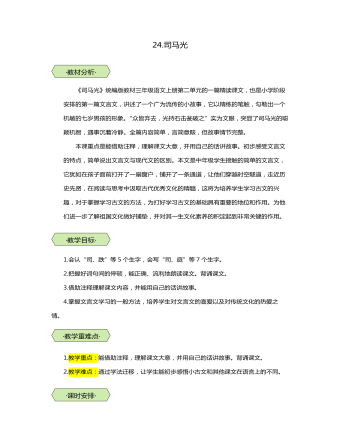
统编版三年级语文上第24课司马光教学设计教案
《司马光》统编版教材三年级语文上册第二单元的一篇精读课文,也是小学阶段安排的第一篇文言文,讲述了一个广为流传的小故事,它以精练的笔触,勾勒出一个机敏的七岁男孩的形象。“众皆弃去,光持石击瓮破之”实为文眼,突显了司马光的聪颖机智,遇事沉着冷静。全篇内容简单,言简意赅,但故事情节完整。本课重点是能借助注释,理解课文大意,并用自己的话讲故事。初步感受文言文的特点,简单说出文言文与现代文的区别。本文是中年级学生接触的简单的文言文,它犹如在孩子面前打开了一扇窗户,铺开了一条通道,让他们穿越时空隧道,走近历史先贤,在阅读与思考中汲取古代优秀文化的精髓,这将为培养学生学习古文的兴趣,对于掌握学习古文的方法,为打好学习古文的基础具有重要的地位和作用。为他们进一步了解祖国文化做好铺垫,并对其一生文化素养的积淀起到非常关键的作用。 1.会认“司、跌”等5个生字,会写“司、庭”等7个生字。2.把握好词句间的停顿,能正确、流利地朗读课文。背诵课文。3.借助注释理解课文内容,并能用自己的话讲故事。4.掌握文言文学习的一般方法,培养学生对文言文的喜爱以及对传统文化的热爱之情。 1.教学重点:能借助注释,理解课文大意,并用自己的话讲故事。背诵课文。2.教学难点:通过学法迁移,让学生能初步感悟小古文和其他课文在语言上的不同。 2课时
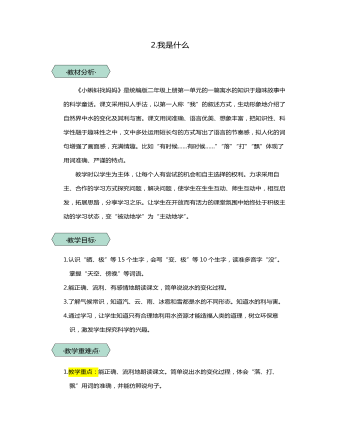
统编版二年级语文上第2课我是什么教学设计教案
《小蝌蚪找妈妈》是统编版二年级上册第一单元的一篇寓水的知识于趣味故事中的科学童话。课文采用拟人手法,以第一人称“我”的叙述方式,生动形象地介绍了自然界中水的变化及其利与害。课文用词准确、语言优美、想象丰富,把知识性、科学性融于趣味性之中,文中多处运用短长句的方式写出了语言的节奏感,拟人化的词句增强了画面感,充满情趣。比如“有时候……有时候……”“落”“打”“飘”体现了用词准确、严谨的特点。教学时以学生为主体,让每个人有尝试的机会和自主选择的权利。力求采用自主、合作的学习方式探究问题,解决问题,使学生在生生互动、师生互动中,相互启发,拓展思路,分享学习之乐。让学生在开放而有活力的课堂氛围中始终处于积极主动的学习状态,变“被动地学”为“主动地学”。 ·教学目标· 1.认识“晒、极”等15个生字,会写“变、极”等10个生字,读准多音字“没”。掌握“天空、傍晚”等词语。2.能正确、流利、有感情地朗读课文,简单说说水的变化过程。3.了解气候常识,知道汽、云、雨、冰雹和雪都是水的不同形态。知道水的利与害。4.通过学习,让学生知道只有合理地利用水资源才能造福人类的道理,树立环保意识,激发学生探究科学的兴趣。 ·教学重难点· 1.教学重点:能正确、流利地朗读课文。简单说出水的变化过程,体会“落、打、飘”用词的准确,并能仿照说句子。2.教学难点:了解气候常识,知道汽、云、雨、冰雹和雪都是水的不同形态。知道水的利与害。
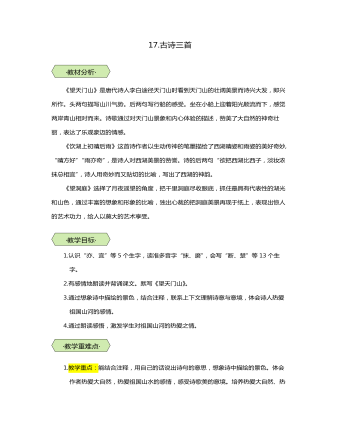
统编版三年级语文上第17课古诗三首教学设计教案
《望天门山》是唐代诗人李白途径天门山时看到天门山的壮阔美景而诗兴大发,即兴所作。头两句描写山川气势。后两句写行船的感受。坐在小船上迎着阳光顺流而下,感觉两岸青山相对而来。诗歌通过对天门山景象和内心体验的描述,赞美了大自然的神奇壮丽,表达了乐观豪迈的情感。《饮湖上初晴后雨》这首诗作者以生动传神的笔墨描绘了西湖晴姿和雨姿的美好奇妙,?“晴方好”“雨亦奇”,是诗人对西湖美景的赞誉。诗的后两句“欲把西湖比西子,淡妆浓抹总相宜”,诗人用奇妙而又贴切的比喻,写出了西湖的神韵。《望洞庭》选择了月夜遥望的角度,把千里洞庭尽收眼底,抓住最具有代表性的湖光和山色,通过丰富的想象和形象的比喻,独出心裁的把洞庭美景再现于纸上,表现出惊人的艺术功力,给人以莫大的艺术享受。 1.认识“亦、宜”等5个生字,读准多音字“抹、磨”,会写“断、楚”等13个生字。2.有感情地朗读并背诵课文。默写《望天门山》。3.通过想象诗中描绘的景色,结合注释,联系上下文理解诗意与意境,体会诗人热爱祖国山河的感情。4.通过朗读感悟,激发学生对祖国山河的热爱之情。 1.教学重点:能结合注释,用自己的话说出诗句的意思,想象诗中描绘的景色。体会作者热爱大自然,热爱祖国山水的感情,感受诗歌美的意境。培养热爱大自然、热爱祖国的情感。2.教学难点:体会诗文的内容,体会诗人的思想感情。 3课时
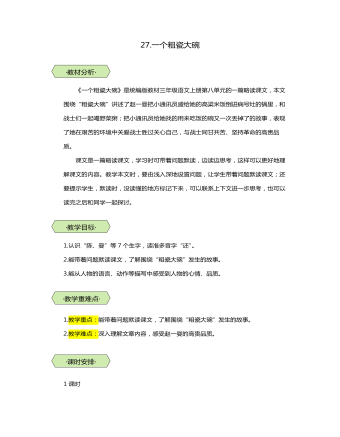
统编版三年级语文上第27课一个粗瓷大碗教学设计教案
《一个粗瓷大碗》是统编版教材三年级语文上册第八单元的一篇略读课文,本文围绕“粗瓷大碗”讲述了赵一曼把小通讯员盛给她的高粱米饭倒进病号灶的锅里,和战士们一起喝野菜粥;把小通讯员给她找的用来吃饭的碗又一次丢掉了的故事,表现了她在艰苦的环境中关爱战士胜过关心自己,与战士同甘共苦、坚持革命的高贵品质。课文是一篇略读课文,学习时可带着问题默读,边读边思考,这样可以更好地理解课文的内容。教学本文时,要由浅入深地设置问题,让学生带着问题默读课文;还要提示学生,默读时,没读懂的地方标记下来,可以联系上下文进一步思考,也可以读完之后和同学一起探讨。 1.认识“陈、曼”等7个生字,读准多音字“还”。2.能带着问题默读课文,了解围绕“粗瓷大碗”发生的故事。3.能从人物的语言、动作等描写中感受到人物的心情、品质。 1.教学重点:能带着问题默读课文,了解围绕“粗瓷大碗”发生的故事。2.教学难点:深入理解文章内容,感受赵一曼的高贵品质。 1课时
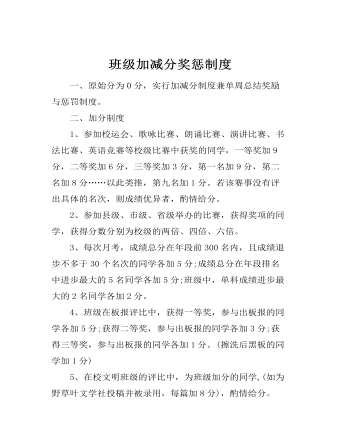
班级加减分奖惩制度
二、加分制度 1、参加校运会、歌咏比赛、朗诵比赛、演讲比赛、书法比赛、英语竞赛等校级比赛中获奖的同学,一等奖加9分,二等奖加6分,三等奖加3分,第一名加9分,第二名加8分……以此类推,第九名加1分。若该赛事没有评出具体的名次,则成绩优异者,酌情给分。 2、参加县级、市级、省级举办的比赛,获得奖项的同学,获得分数分别为校级的两倍、四倍、六倍。 3、每次月考,成绩总分在年段前300名内,且成绩退步不多于30个名次的同学各加5分;成绩总分在年段排名中进步最大的5名同学各加5分;班级中,单科成绩进步最大的2名同学各加2分。 4、班级在板报评比中,获得一等奖,参与出板报的同学各加5分;获得二等奖,参与出板报的同学各加3分;获得三等奖,参与出板报的同学各加1分。(擦洗后黑板的同学加1分) 5、在校文明班级的评比中,为班级加分的同学,(如为野草叶文学社投稿并被录用,每篇加8分),酌情给分。 6、做有益于班级,有助于提升班级形象的事(比如拾金不昧、义务劳动等),酌情给分。 7、为班级发展建言献策,富有建设性且付诸实施的同学,酌情给分。
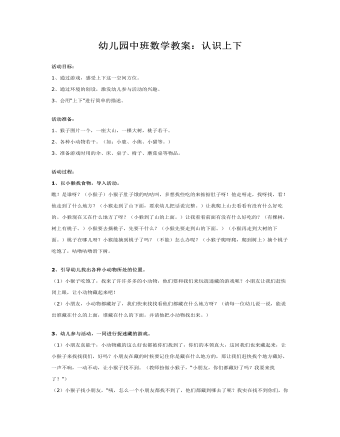
幼儿园中班数学教案:认识上下
活动准备: 1、猴子图片一个,一座大山,一棵大树,桃子若干。 2、各种小动物若干。(如:小鹿、小熊、小猫等。) 3、准备游戏时用的伞、床、桌子、椅子、蘑菇桌等物品。活动过程:1、以小猴找食物,导入活动。 瞧!是谁呀?(小猴子)小猴子肚子饿的咕咕叫,多想找些吃的来掂掂肚子呀!他走呀走,找呀找,看!他走到了什么地方?(小猴走到了山下面,要求幼儿把话说完整。)让我爬上山去看看有没有什么好吃的。小猴现在又在什么地方了呀?(小猴到了山的上面。)让我看看前面有没有什么好吃的?(有棵树,树上有桃子。)小猴要去摘桃子,先要干什么?(小猴先要走到山的下面。)(小猴再走到大树的下面。)桃子在哪儿呀?小猴能摘到桃子了吗?(不能)怎么办呢?(小猴子爬呀爬,爬到树上)摘个桃子吃饱了,咕噜咕噜滑下树。
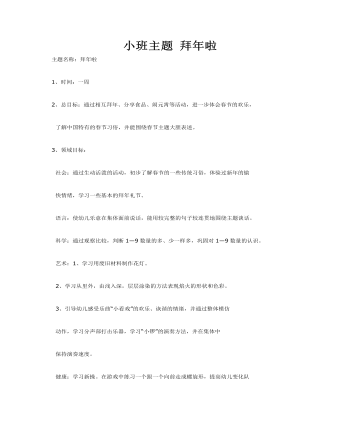
小班主题 拜年啦课件教案
2、总目标:通过相互拜年、分享食品、闹元霄等活动,进一步体会春节的欢乐, 了解中国特有的春节习俗,并能围绕春节主题大胆表述。3、领域目标: 社会:通过生动活泼的活动,初步了解春节的一些传统习俗,体验过新年的愉 快情绪,学习一些基本的拜年礼节。 语言:使幼儿乐意在集体面前说话,能用较完整的句子较连贯地围绕主题谈话。 科学:通过观察比较,判断1—9数量的多、少一样多,巩固对1—9数量的认识。 艺术:1、学习用废旧材料制作花灯。 2、学习从里外,由浅入深,层层涂染的方法表现焰火的形状和色彩。 3、引导幼儿感受乐曲“小看戏”的欢乐、诙谐的情绪,并通过整体模仿 动作,学习分声部打击乐器,学习“小锣”的演奏方法,并在集体中 保持演奏速度。 健康:学习新操。在游戏中练习一个跟一个向前走成螺旋形,提高幼儿变化队 形的能力。4、主题预设网拜年啦 5、教学活动 活动一:社会:我们去拜年 活动二:打击乐:小看戏(一) 活动三:谈话:压岁钱 活动四:绘画 礼花 活动五:科学 复习1—9数量 活动六:谈话 美丽的花灯 活动七:韵律活动 观花灯 活动八:手工 制作花灯 活动九:综合活动(半日活动)闹元霄 活动十:智游:化妆舞会 活动十一:打击乐:小看戏(二) 活动十二:健康:舞龙灯

